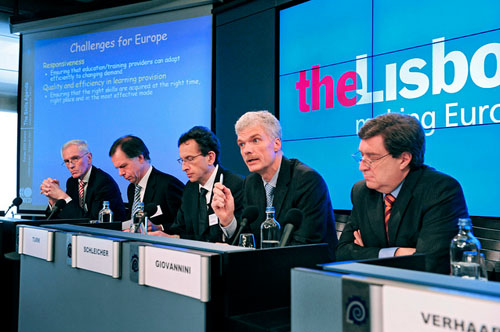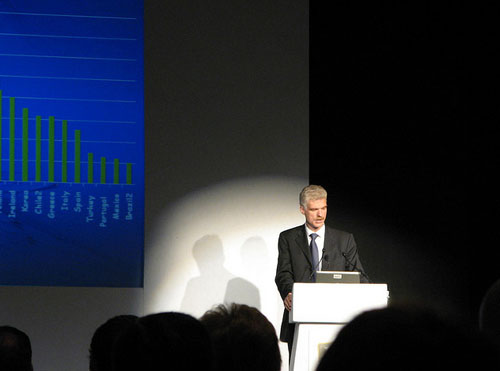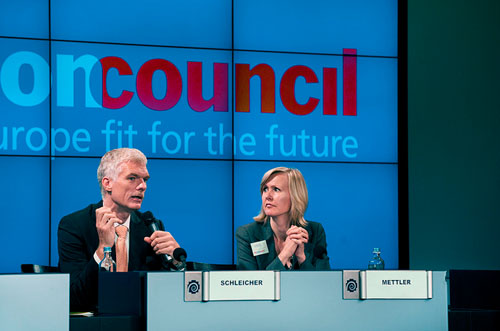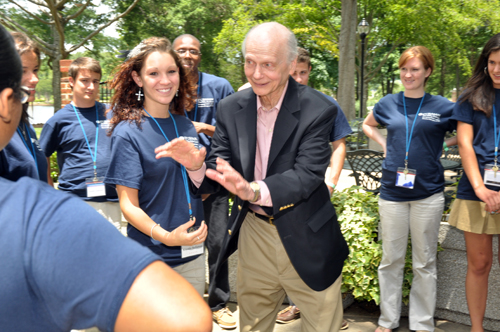
According to Andreas Schleicher of OECD, the United States is unique among countries in that the generation of workers entering the US workforce does not have higher college attainment levels than the generation about to leave the workforce. He further believes a key strategy to addressing this problem is improving equitable access to education across the board and that good examples of how to achieve this can be found in other education systems such as Finland, Canada, Japan or Korea. None of this sounds particularly new, but I wondered if Andreas were making the big picture education decisions, how would he address some of our key issues? We recently had the opportunity to discuss this further.
Andreas Schleicher is Special Advisor on Education Policy to OECD’s Secretary-General, and is Deputy Director for Education. He also provides strategic oversight over OECD’s work on the development and utilization of skills and their social and economic outcomes. This includes the Programme for International Student Assessment (PISA), the OECD Survey of Adult Skills (PIAAC), the OECD Teaching and Learning International Survey (UN TEL), and the development and analysis of benchmarks on the performance of education systems (INES).

Should government provide tuition free education from pre-school through college?
There is no free education; someone has to pay. If governments provide free education from pre-school through college, they need to back that up with a steeply progressive tax system so that the better qualified people end up paying the bill eventually. The Nordic countries in Europe show that this can work, and work well. The other good option is to ask students to pay tuition and to back that up with a universal student support system that provides an income-contingent loan system complemented with a scheme of means-tested grants. In that way you minimize risks for students, avoid that they end up with huge debt that they cannot pay back, and you provide special assistance to those students who would otherwise be prevented from attending university. The UK shows how this can work. Providing college tuition-free without getting the money back through taxes for the better-educated means that the poor end up subsidizing the education of the rich.
Êtes-vous en faveur de la privatisation des écoles publiques?
Les résultats du PISA montrent aucun avantage de performance des écoles privées, une fois de vous rendre compte de l'origine sociale. Cependant, analyse cross-country du PISA suggère que la prévalence des écoles’ autonomy to define and elaborate their curricula and assessments relates positively to the performance of school systems, even after accounting for national income. School systems that provide schools with greater discretion in deciding student assessment policies, the courses offered, the course content and the textbooks used are also school systems that perform at higher levels. So perhaps the question for countries is not how many private or charter schools they have, but how they enable every public school to assume charter-type responsibility.

Since every child is probably not meant to pursue a liberal arts education, what would you do to make our children more competitive in the skilled trade jobs market?
Our data show that when employers are involved in designing curricula and delivering education programs at the post-secondary level, students seem to have a smoother transition from education into the labor market. Compared to purely government-designed curricula taught in school-based systems, learning in the workplace offers several advantages: it allows trainees to develop “hard” skills on modern equipment, et “soft” compétences, such as teamwork, communication and negotiation, through real-world experience. La formation pratique en milieu de travail peuvent également aider à motiver les jeunes désengagés de rester ou de renouer le dialogue avec le système d'éducation. la formation en milieu de travail facilite aussi le recrutement en permettant aux employeurs et employés potentiels d'apprendre à connaître l'autre, tandis que les stagiaires contribuent à la sortie de l'entreprise de formation. des possibilités d'apprentissage en milieu de travail sont aussi une expression directe des employeurs’ besoins, que les employeurs seront prêts à offrir des opportunités dans les zones où il ya une pénurie de compétences.

Do you think that the United States needs to do more in the area of early childhood education, et si oui,, quoi?
One the one hand, the US falls well behind most countries in the industrialized world when it comes to early childhood education, and this is clearly a key lever to raise quality and equity in learning outcomes. À la fois, the US does really well when you look at student performance in primary education, so-so when it comes to performance in middle school, and not very well when it comes to performance in high school. This suggests that students actually get quite a strong start, but the school system adds less year after year than what children in other countries learn. That is something you don’t address with better early childhood education but with a better school system.
What do you think is the best way to fund our public schools?
The US spends plenty of money on public schools, but our data show three things. Tout d'abord, une part disproportionnée élevé de ces dépenses ne fait pas dans la salle de classe. Deuxièmement, les dépenses est régressif que les écoles dans les zones défavorisées se retrouvent avec moins de ressources que les écoles dans les zones socialement défavorisées (dans pratiquement tous les autres pays industrialisés, il est dans l'autre sens). Cela ne permet pas aux États-Unis pour attirer les enseignants les plus talentueux dans les classes les plus difficiles, ce qui rendrait plus efficace des dépenses publiques. Troisième, high performing countries tend to prioritize the quality of teachers and the size of classes. The trend in the US over the last decade has gone the other way around.

Photos courtesy of OECD.
Dans La Recherche globale pour l'éducation, joindre à moi et leaders d'opinion de renommée mondiale dont Sir Michael Barber (Royaume-Uni), Dr. Michael Bloquer (États-Unis), Dr. Leon Botstein (États-Unis), Professeur Clay Christensen (États-Unis), Dr. Linda Darling-Hammond (États-Unis), Dr. Madhav Chavan (Inde), Le professeur Michael Fullan (Canada), Professeur Howard Gardner (États-Unis), Professeur Andy Hargreaves (États-Unis), Professeur Yvonne Hellman (Pays-Bas), Professeur Kristin Helstad (Norvège), Jean Hendrickson (États-Unis), Professeur Rose Hipkins (Nouvelle-Zélande), Professeur Cornelia Hoogland (Canada), Honorable Jeff Johnson (Canada), Mme. Chantal Kaufmann (Belgique), Dr. Eija Kauppinen (Finlande), Le secrétaire d'Etat Tapio Kosunen (Finlande), Professor Dominique Lafontaine (Belgique), Professeur Hugh Lauder (Royaume-Uni), Professeur Ben Levin (Canada), Seigneur Ken Macdonald (Royaume-Uni), Professeur Barry McGaw (Australie), Shiv Nadar (Inde), Professeur R. Natarajan (Inde), Dr. PAK NG (Singapour), Dr. Denise Pape (États-Unis), Sridhar Rajagopalan (Inde), Dr. Diane Ravitch (États-Unis), Richard Wilson Riley (États-Unis), Sir Ken Robinson (Royaume-Uni), Professeur Pasi Sahlberg (Finlande), Andreas Schleicher (PISA, OCDE), Dr. Anthony Seldon (Royaume-Uni), Dr. David Shaffer (États-Unis), Dr. Kirsten immersive, (Norvège), Chancelier Stephen Spahn (États-Unis), Yves Thézé (Lycee Francais U.S.), Professeur Charles Ungerleider (Canada), Professeur Tony Wagner (États-Unis), Sir David Watson (Royaume-Uni), Professeur Dylan Wiliam (Royaume-Uni), Dr. Mark Wormald (Royaume-Uni), Professeur Theo Wubbels (Pays-Bas), Professeur Michael Young (Royaume-Uni), et le professeur Zhang Minxuan (Chine) alors qu'ils explorent les grandes questions d'éducation de l'image que toutes les nations doivent faire face aujourd'hui. La recherche globale pour l'éducation communautaire page
C. M. Rubin est l'auteur de deux séries en ligne largement lecture pour lequel elle a reçu une 2011 Upton Sinclair prix, “La recherche globale pour l'éducation” et “Comment allons-nous savoir?” Elle est également l'auteur de trois livres à succès, Y compris The Real Alice au pays des merveilles.
Suivez C. M. Rubin sur Twitter: www.twitter.com/@cmrubinworld






Commentaires récents